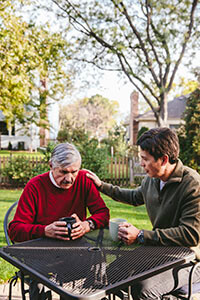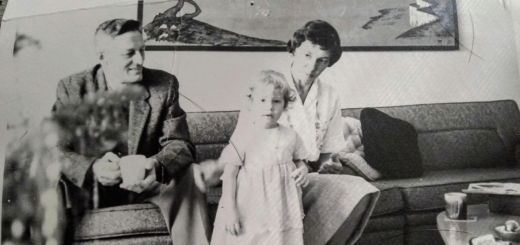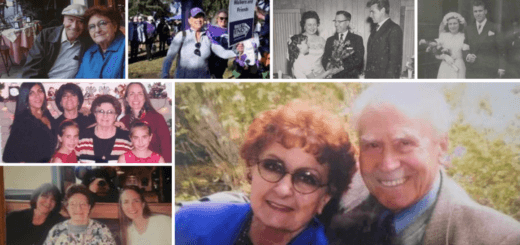Tips for caregivers who resist help
By Stefanie Bonigut
We often receive calls on our 24/7 Helpline (800.272.3900) from people who are gathering information on our programs to share with a relative or friend who is an unpaid caregiver for someone living with Alzheimer’s or other dementia.
They ask questions such as:
- “How can I make them call the Helpline?”
- “How do I get my relative/friend to reach out for education and support?
- “Why don’t they appreciate the information I’m passing on to them?”
Sometimes these callers express frustration that they have shared the Helpline number with the caregiver, but the caregiver has not followed through in calling. Let’s talk about the reasons behind this resistance and ways to get past it.
Sources of resistance
This issue of caregiver resistance is common. It’s important not to judge them for their actions (or inaction). It can help to understand the reasons behind their resistance to our advice or suggestions.
Coping mechanism
Put yourself in their shoes and think about how they might be feeling about the change in their relationship now that they have added “caregiver” to their title of “partner/spouse,” “child” or “friend.”
It’s also helpful to know that resistance is a coping mechanism – a way to protect oneself in a stressful situation. We have all used this strategy at some point in our lives.
Guilt
Guilt can be a major reason for resistance. A caregiver might feel that reaching out for help means they have failed in some way. Failed to uphold a vow. Failed to fulfill their filial duty/familial responsibility. Failed to provide care that they should be able to do on their own.
Getting respite help may also fuel guilt as the caregiver might think it’s selfish that they are able to enjoy life while their loved one is struggling to live with dementia.
I’ve got this
Caregivers may not think they need help yet. It’s common for caregivers to pick up tasks the person living with dementia was doing or start providing additional help without much conscious thought.
Denial
Caregivers might be in denial. Since dementia is a progressive disease, caregivers grieve every decline in function as it happens. This may cause caregivers to use denial as a coping mechanism.
Denial isn’t inherently bad; it can be protective in distressing situations. But getting stuck in denial isn’t good and can lead to resistance.
It’s too much work
Logistics can also be a part of caregiver resistance. A caregiver may feel they don’t have time to call the Helpline or attend a support group or educational workshop. There’s always too much to do. Even with many of our Alzheimer’s Association caregiver support groups and educational workshops being offered virtually, a caregiver might not have a private place from which to participate.
A caregiver might also feel that it is harder to organize and manage outside help than it is to do it theirself. The caregiver might think that they will have to put a lot of effort into managing any care they bring into the home.
Or they might think they will have to provide transportation to and from the adult day center. It can be overwhelming to think of all the “what if’s” of getting help.
Cost
While a call to the Helpline is free, cost may play a role in caregiver resistance to getting help. Caregivers may not understand the wide range of costs for different services available to them.
For many, the costs of services to assist with providing care are financially out of reach. They may not be aware of the different ways to pay for services or that many services have sliding scale fees.
Overcoming resistance
Now that we understand some of the causes of caregiver resistance, how do we help caregivers get through it? Here are a few tips:
Put yourself in their shoes
One of the most important ways to support a caregiver is to not judge them; try to meet them where they are and understand their point of view. You can do this by simply asking how they are. It is common for participants in our caregiver support groups to say that their family and friends ask about how the person living with dementia is doing but caregivers rarely get asked how they are doing.
Use active listening
When you ask, be prepared to really listen to what the caregiver has to say. Be present, don’t jump in, and don’t try to solve their problems.
Don’t interrupt. Use active listening skills –summarize or paraphrase what they have said and ask clarifying questions if necessary. If you use these techniques, the caregiver will know that you understand what’s going on for them.
Use I statements, avoid you statements
Be honest but gentle about your concerns, especially if you are worried about the caregiver’s health and well-being. Using “I” statements is powerful in these situations. “I” statements let you express your feelings and thoughts and do not convey blame on the person you are speaking with.
Caregivers often hear “you” statements about their caregiving. “You can’t do this alone.” “You really need help.” “You should bring in home care.” “You” statements can make many feel defensive and resistant.
“You” statements can easily be changed into “I” statements. Instead of saying, “You can’t do this alone,” try saying “I worry about your health, doing all this caregiving on your own.” It lets the caregiver know that you care and are supportive and that you’re not blaming them for anything.
Seek permission
Ask the caregiver for permission to reach out on their behalf. Or if you have already gathered information, ask if they would like you to share it with them. This shows that you are not trying to impose on them or take charge of the situation.
It could be as simple as, “I noticed there is an adult day program near the mall. I stopped and got information from them. Would you like me to share what I learned?” This shows that you care, understand, and respect where they are.
Once you have opened the door, continue to ask permission to help in other ways. That may include arranging and organizing a service or attending a group, appointment, or meeting with them.
Be patient
Sometimes you just need to step back and be patient while continuing to let the caregiver know that you are there when they need you. I once had a caregiver in a support group who was wonderfully supportive to the other caregivers, respectfully offering ideas while routinely resisting these same ideas, despite saying they were overwhelmed.
After regularly attending the monthly caregiver support group for over two years, the caregiver reached out to me after a group and said it was time for them to get help. We sat together and made a plan.
It took more than two years for this caregiver to get to the place where they were ready for help. Don’t give up on them and be ready for when they need you.
Potential links:




















